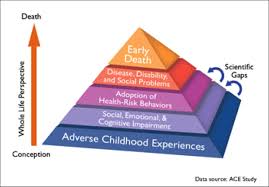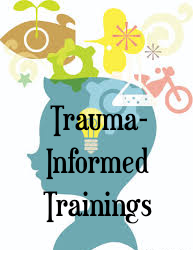According to the California Mental Health Planning Council report on Trauma-Informed Care in California: A Snapshot, “Trauma is a widespread, harmful, and costly public health problem.” Trauma has no boundaries and affects children and adults from all socioeconomic and ethnic backgrounds. It is one of the common denominators for individuals receiving services from social services organizations and its impact is clearly seen in correctional institutions, jails, schools, hospitals, and the workplace.
Trauma is defined as a distressing or disturbing experience. When it is chronic and untreated, it becomes Toxic Stress and has serious impact on individual health, social and cultural structure, and economic stability. It adversely affects children’s physical and mental health and can result in death.
The ACE Study (ACEs):

The connection between traumatic childhood experiences and physical and emotional health outcomes was dramatically exposed in the landmark Adverse Childhood Experiences study (ACEs) conducted by Kaiser Permanente in San Diego, California. The study was one of the largest of its size with 17,000 participants, each of whom completed 10 questions on the number of adverse experiences they suffered while growing up. Two-thirds of the participants reported at least one ACE that included:
- Physical, emotional or sexual abuse
- Emotional or physical neglect
- Growing up in a household where someone was an alcoholic, drug user, mental ill, or suicidal
- Family violence
- Incarcerated family member
Individuals who had 4 or more ACES had an increased use of smoking, alcoholism, street drug use, and suicide. Additionally, these individuals suffered from physical issues ranging from high blood pressure to obesity to cancer and more.
What’s your ACE Score?
The most important thing to remember is that the ACE score is meant as a guideline: If you experienced other types of toxic stress over months or years, then those would likely increase your risk of health consequences.
Prior to your 18th birthday:
- Did a parent or other adult in the household often or very often… Swear at you, insult you, put you down, or humiliate you? or Act in a way that made you afraid that you might be physically hurt?
No___If Yes, enter 1 __ - Did a parent or other adult in the household often or very often… Push, grab, slap, or throw something at you? or Ever hit you so hard that you had marks or were injured?
No___If Yes, enter 1 __ - Did an adult or person at least 5 years older than you ever… Touch or fondle you or have you touch their body in a sexual way? or Attempt or actually have oral, anal, or vaginal intercourse with you?
No___If Yes, enter 1 __ - Did you often or very often feel that … No one in your family loved you or thought you were important or special? or Your family didn’t look out for each other, feel close to each other, or support each other?
No___If Yes, enter 1 __ - Did you often or very often feel that … You didn’t have enough to eat, had to wear dirty clothes, and had no one to protect you? or Your parents were too drunk or high to take care of you or take you to the doctor if you needed it?
No___If Yes, enter 1 __ - Was a biological parent ever lost to you through divorce, abandonment, or other reason?
No___If Yes, enter 1 __ - Was your mother or stepmother:
Often or very often pushed, grabbed, slapped, or had something thrown at her? or Sometimes, often, or very often kicked, bitten, hit with a fist, or hit with something hard? or Ever repeatedly hit over at least a few minutes or threatened with a gun or knife?
No___If Yes, enter 1 __ - Did you live with anyone who was a problem drinker or alcoholic, or who used street drugs?
No___If Yes, enter 1 __ - Was a household member depressed or mentally ill, or did a household member attempt suicide? No___If Yes, enter 1 __
- Did a household member go to prison?
No___If Yes, enter 1 __
Now add up your “Yes” answers. This is your ACE Score.
This study sparked a nation-wide interest in the impact of trauma on public health and has increased the awareness of siloed human services delivery. Despite this new understand, parents and professionals are struggling with how to use the information in a practical, real way.
The Financial Cost Of Trauma:
According to a Centers for Disease Control and Prevention study released in 2012, just one confirmed case of child maltreatment costs $124 billion over the lifetime of the traumatized children. The report estimated that the average lifetime cost per victim of nonfatal child maltreatment includes:
$32,648 in childhood health care costs
$10,530 in adult medical costs
$144,360 in productivity losses
$7,728 in child welfare costs
$6,747 in criminal justice costs
$7,999 in special education costs
The estimated average lifetime cost per death includes:
$14,100 in medical costs
$1,258,800 in productivity losses
Child Welfare Services and other Social Service Agencies:
The application of Trauma-Informed Care is not just about saving money. It also protects the public health and saves lives.
Trauma is the central problem among populations that have been involved with the child welfare system. Each person in the system is touched by workers in the child welfare system from the front office worker to the social worker to the foster parents. This asserts a need to build a common understanding and awareness to foster safety and a strengths-based delivery of services.
An estimated 1 in 4 of US children experiences some form of child maltreatment in their lifetime. In 2012, US state and local child protective services received an estimated 3.4 million referrals of children being abused and neglected. The result of suspected child abuse and neglect referral may lead to removal from biological parents and family and placement in a stranger home. Many children move from placement to placement before a permanent home is found. All of these elements are traumatic, resulting in what is called toxic stress.
A study of children in foster care revealed that PTSD was diagnosed in 60% of the sexually abused children and in 42% of the physically abused children. They also found that 18% of the foster children who had not experienced either type of abuse had PTSD, possibly as a result of exposure to domestic or community violence.
One of the Trauma-Informed Care is to change attitudes toward traumatized people from “what’s wrong with this person” to “what’s happening to this person” through the use of concrete exercises and ideas.
A Client’s Access to Care:
Trauma affects how people access to care. People who have experienced on-going trauma may view the world and other people as unsafe. Those who have repeatedly been hurt by others may come to believe that people cannot be trusted. This lack of trust and a need to be constantly on-guard making it difficult for families to ask for help, trust providers, or form relationships. When institutions do not utilize trauma-informed care principles, people will not use the services that are available to them and may create even more psychological harm.
Permanency and Children in Care:
The national goal of the Adoption and Safe Families Act of 1997 for children in the child welfare system are safety, permanency, and well being. For children with a history of trauma, such goals can be particularly difficult to achieve. In the absence of more positive coping strategies, these disruptions to the child’s sense of safety, permanency, and well-being can foster a range of high-risk or destructive coping behaviors ranging from reckless behavior to substance abuse, smoking, running away, eating disorders, sexual acting out, and self-harm.
The ACE study and subsequent research on trauma have raised the need for a system of Trauma-Informed Care. Many organizations have begun to use the umbrella term “Trauma-Informed Practices” in their individual settings but few really know what this means or how to when applying the ideas to local needs and daily interactions with children and families.
What can you do?
Let Ron Huxley help you or your organization find new pathways to healing for adverse childhood events (trauma). Contact Ron today at (805) 709-2023 or rehuxley@gmail.com.
